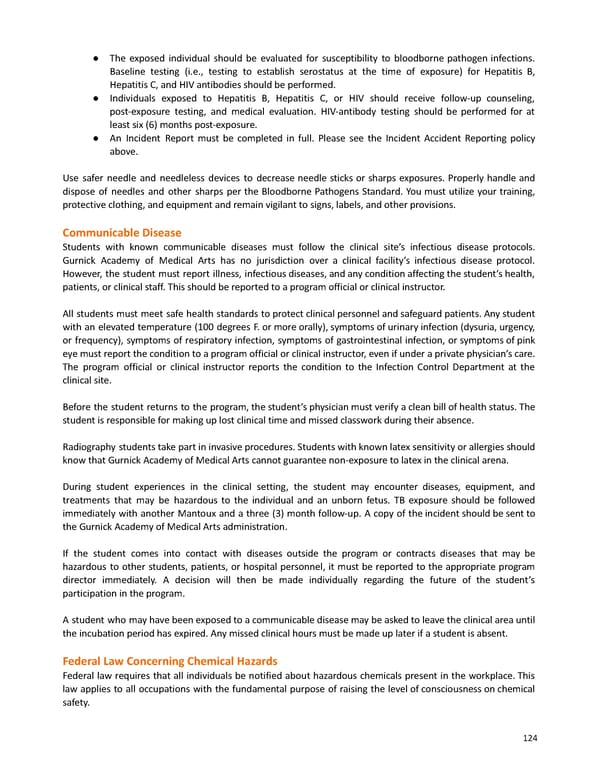● The exposed individual should be evaluated for susceptibility to bloodborne pathogen infections. Baseline testing (i.e., testing to establish serostatus at the time of exposure) for Hepatitis B, Hepatitis C, and HIV antibodies should be performed. ● Individuals exposed to Hepatitis B, Hepatitis C, or HIV should receive follow-up counseling, post-exposure testing, and medical evaluation. HIV-antibody testing should be performed for at least six (6) months post-exposure. ● An Incident Report must be completed in full. Please see the Incident Accident Reporting policy above. Use safer needle and needleless devices to decrease needle sticks or sharps exposures. Properly handle and dispose of needles and other sharps per the Bloodborne Pathogens Standard. You must utilize your training, protective clothing, and equipment and remain vigilant to signs, labels, and other provisions. CommunicableDisease Students with known communicable diseases must follow the clinical site’s infectious disease protocols. Gurnick Academy of Medical Arts has no jurisdiction over a clinical facility’s infectious disease protocol. However, the student must report illness, infectious diseases, and any condition affecting the student’s health, patients, or clinical staff. This should be reported to a program official or clinical instructor. All students must meet safe health standards to protect clinical personnel and safeguard patients. Any student with an elevated temperature (100 degrees F. or more orally), symptoms of urinary infection (dysuria, urgency, or frequency), symptoms of respiratory infection, symptoms of gastrointestinal infection, or symptoms of pink eyemustreporttheconditiontoaprogramofficialorclinicalinstructor,evenifunderaprivatephysician’scare. The program official or clinical instructor reports the condition to the Infection Control Department at the clinical site. Before the student returns to the program, the student’s physician must verify a clean bill of health status. The student is responsible for making up lost clinical time and missed classwork during their absence. Radiography students take part in invasive procedures. Students with known latex sensitivity or allergies should knowthatGurnickAcademyofMedicalArtscannotguaranteenon-exposuretolatexintheclinicalarena. During student experiences in the clinical setting, the student may encounter diseases, equipment, and treatments that may be hazardous to the individual and an unborn fetus. TB exposure should be followed immediately with another Mantoux and a three (3) month follow-up. A copy of the incident should be sent to theGurnickAcademyofMedicalArtsadministration. If the student comes into contact with diseases outside the program or contracts diseases that may be hazardous to other students, patients, or hospital personnel, it must be reported to the appropriate program director immediately. A decision will then be made individually regarding the future of the student’s participation in the program. A student who mayhavebeenexposedtoacommunicablediseasemaybeaskedtoleavetheclinicalareauntil theincubationperiodhasexpired.Anymissedclinicalhoursmustbemadeuplaterifastudentisabsent. Federal Law Concerning Chemical Hazards Federal law requires that all individuals be notified about hazardous chemicals present in the workplace. This law applies to all occupations with the fundamental purpose of raising the level of consciousness on chemical safety. 124
 2023-2024 | Catalog Page 123 Page 125
2023-2024 | Catalog Page 123 Page 125